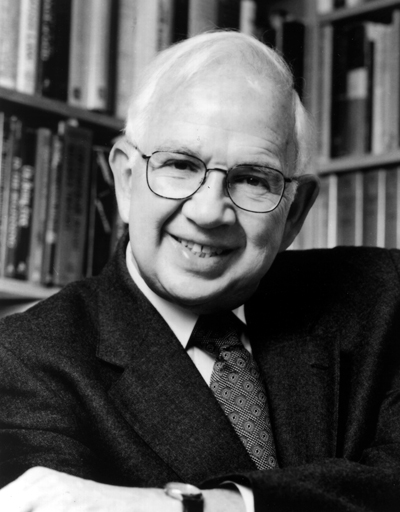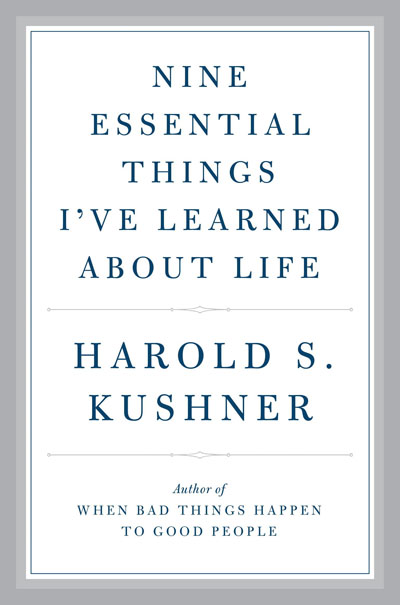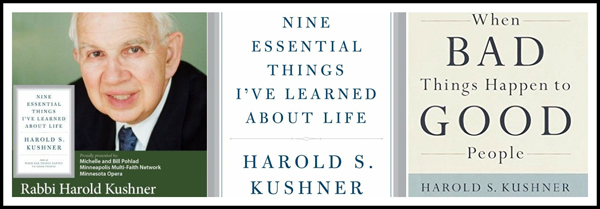When Bad Things Happen to Good People
Heather McElhatton
Part of A Beautiful World
"God's world is flawed and less than perfect, just like the people I love."
Rabbi Harold S. Kushner is the Rabbi Laureate of Temple Israel in Natick, Massachusetts and beloved author of the bestselling book, When Bad Things Happen to Good People. It's a memoir reflecting on how Kushner's relationship to God changed after his son Aaron was born with a rare and painful premature-aging disease called progeria.
Kushner says Aaron's premature death at the young age of thirteen forced him to re-consider everything he'd been taught in rabbinical school. "I had to leave behind the idea that if you're good, God rewards you. It took me years to come to the understanding that God does not send the problem, God sends us the grace to handle the problem."

This was a major departure from Kushner's orthodox training, rejecting the idea that God is all-powerful and hands out problems to people as punishment, or so they'll learn from the experience. Instead, Kushner embraced the concept that in order to preserve man's free will, God created the world with a natural order of rules that must be obeyed, even by him. This revelation gave Kushner an answer to some of his biggest and hardest spiritual questions.
"The answer I got, was for my wife and myself to find within ourselves the ability to accept and love a world in which bad things happen to good people. To let the goodness, and the love, and the kindness, and the humor, and the helpfulness… to let them dominate our perception of what we see when we look at the world. To not to let the rare misfortune define what the world will mean to us."

It is a timely message, which resides at the very heart of the Rabbi's latest and last book: Nine Essential Things I've Learned About Life. (Knopf, 2015.) The book is a collection of key lessons he's learned over his long and venerated life, as a beloved rabbi and "a flawed human being." In this final message to his readers, Kushner encourages people to challenge their beliefs and accept their lives, imperfections and all. He believes deeply in the power of the second chance and says forgiveness is a favor you do yourself.
"A good life doesn't have to be 100% safe or 100% successful. People can fail, people can make mistakes. People can make serious mistakes, mess up their first marriages and embark on a second one, deform their children because they were such inexperienced parents, offend people who deserve better from their hand…and it doesn't mark them forever. You can repent. You can outgrow the mistakes and if you realize they were mistakes, you can lean in the other direction and make sure you never do anything like that again."
Rabbi Kushner says his final book is a sort of guide for people trying to survive a sometimes cruel and unkind world…. he says that despite all the bad news we're bombarded with every day we must remember how much in our world has already changed for the better.
"What you do is look at history and look at how we've changed. Things which were unacceptable a hundred years ago are completely unacceptable now. Things which you could get away with in my lifetime - I'm 80 years old - in my lifetime racial prejudice, religious prejudice, disregarding the needs of women, these were all commonly accepted, they defined our culture. But in the space of one person's lifetime, all that has changed. It gives me hope that what still stains the world today will one day be solves as well."
The very last page in his book is a letter and he calls it, "A Love Letter to a World That May or May Not Deserve it."
Dear World,
We've been through a lot together over the past eight decades, you and I-marriages, births, deaths, fulfillment and dis- appointment, war and peace, good times and hard times. There were days when you were more generous to me than I could possibly have deserved. And there were days when you cheated me out of things I felt I was entitled to. There were days when you looked so achingly beautiful that I could hardly believe you were mine, and days when you broke my heart and reduced me to tears. But with it all, I choose to love you. I love you, whether you deserve it or not (and how does one measure that?). I love you in part because you are the only world I have. I love you because I like who I am better when I do. But mostly I love you because loving you makes it easier for me to be grateful for today and hopeful about tomorrow. Love does that.
Faithfully yours,
Harold Kushner

LINKS:
Watch this Interview Video
Penguin Random House: Harold S. Kushner
Discover more stories from A Beautiful World on Soundcloud
Learn more about A Beautiful World


